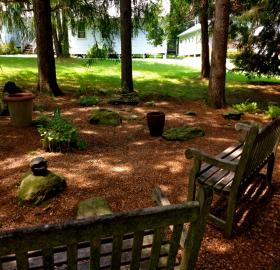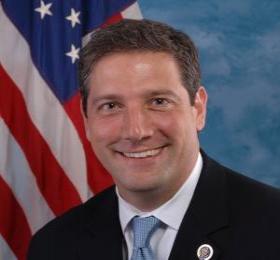Mindfulness in Education Conference (Part One)

If you’re just joining us, check out my previous posts here and here to bring yourselves up to speed.
 The Omega Institute is one of the largest adult education centers in the United States, offering classes to more than 25,000 people each year. The center is located on a gorgeous 195 acre campus in Rhinebeck, New York. The property used to be a children’s summer camp before Omega purchased it in 1982. Although the campus has been largely redeveloped, the cabins, facilities, and the communal dining hall still retain that rustic feel that makes Omega seem like just that: camp, but for adults.
The Omega Institute is one of the largest adult education centers in the United States, offering classes to more than 25,000 people each year. The center is located on a gorgeous 195 acre campus in Rhinebeck, New York. The property used to be a children’s summer camp before Omega purchased it in 1982. Although the campus has been largely redeveloped, the cabins, facilities, and the communal dining hall still retain that rustic feel that makes Omega seem like just that: camp, but for adults.
However, there are certain features that keep Omega from seeming too camp-like. Guests can choose from many accommodation styles, so if you don’t feel like “roughing it” in a tent cabin, you can shell out some more cash for a ritzy deluxe cabin room, complete with a private bathroom and air conditioning (powered by green energy, naturally.) Because I value my privacy, as well as my bank account, I opted for a more affordable single dorm. It was definitely cozy, and I shared bathroom facilities with seven other women, but I thought it was perfect.
Omega also has a fantastic wellness center, which offers all kinds of healing treatments. In between their workshops, guests can treat themselves to a massage, a reiki session, or even a personalized yoga class.
 The food at Omega is incredible. Meals are served buffet-style as a shared community event. Not only is this great for meeting new people, it allows for lots of fruitful discussion with your peers. Meat-eaters, consider yourselves warned: the meals are vegetarian (with vegan and gluten-free options) and prepared with local, organic ingredients as much as possible. This isn’t just because they’re catering to a bunch of hippies; one of Omega’s core values is sustainability, and a local, plant-based diet helps reduce their carbon footprint. Should you desperately need a protein fix, the Omega Café has some non-vegetarian choices available for purchase, along with a delicious array of treats and locally made ice creams. Even so, I’d be surprised if Omega’s talented food staff didn’t manage to tempt even the most ardent carnivore.
The food at Omega is incredible. Meals are served buffet-style as a shared community event. Not only is this great for meeting new people, it allows for lots of fruitful discussion with your peers. Meat-eaters, consider yourselves warned: the meals are vegetarian (with vegan and gluten-free options) and prepared with local, organic ingredients as much as possible. This isn’t just because they’re catering to a bunch of hippies; one of Omega’s core values is sustainability, and a local, plant-based diet helps reduce their carbon footprint. Should you desperately need a protein fix, the Omega Café has some non-vegetarian choices available for purchase, along with a delicious array of treats and locally made ice creams. Even so, I’d be surprised if Omega’s talented food staff didn’t manage to tempt even the most ardent carnivore.
Now that I’m done tooting Omega’s horn -- I wasn’t even paid for this, I swear! -- it’s time for the order of business: the Mindfulness in Education Conference.
As the conference was only from Friday evening to Sunday morning, things got off to a quick start. We dove right into the opening keynote by Congressman Tim Ryan (D - OH). I've seen him speak before, at last year’s Creating a Mindful Society Conference, so while I kind of knew what to expect, I was nonetheless excited.
 Congressman Ryan is a bit of an anomaly in his field, as he practices mindfulness meditation and is actually pretty vocal about it. After seeing the positive benefits in his own life, he became interested in how mindfulness might serve his fellow citizens. He's been on retreats with the likes of Jon Kabat-Zinn, and he has strong ties to educational think tanks such as the Garrison Institute and the Collaborative for Academic, Social, and Emotional Learning (CASEL). In fact, he's been working in partnership with Linda Lantieri, one of the founding board members of CASEL, to implement mindfulness and SEL initiatives in Ohio's Youngstown and Warren city schools. After inviting her to testify before the House Appropriations Subcommittee on Education, his committee granted her almost $1 million in funding. Apparently the results seen in the schools have been transformative. To read more about his pursuits, check out his new book, A Mindful Nation.
Congressman Ryan is a bit of an anomaly in his field, as he practices mindfulness meditation and is actually pretty vocal about it. After seeing the positive benefits in his own life, he became interested in how mindfulness might serve his fellow citizens. He's been on retreats with the likes of Jon Kabat-Zinn, and he has strong ties to educational think tanks such as the Garrison Institute and the Collaborative for Academic, Social, and Emotional Learning (CASEL). In fact, he's been working in partnership with Linda Lantieri, one of the founding board members of CASEL, to implement mindfulness and SEL initiatives in Ohio's Youngstown and Warren city schools. After inviting her to testify before the House Appropriations Subcommittee on Education, his committee granted her almost $1 million in funding. Apparently the results seen in the schools have been transformative. To read more about his pursuits, check out his new book, A Mindful Nation.
For the record, I sincerely like Congressman Ryan. He seems like a down-to-earth, kindhearted man. I loved his spontaneous, intimate speaking style, which he did sans notes -- and sans shoes! It was refreshing to see a public figure joke around, share personal stories about his practice, and even get a little vulnerable. In other words, he acted like a person, not a politician. He wasn't trying to win votes or appease partisan values; he was speaking from the heart. It was clear that he genuinely cares about helping people, especially children, become happier, healthier, and more resilient.
Maybe it’s a matter of personal preference, but I prefer speeches that have an equal “inspiration to information” ratio. And to his credit, Congressman Ryan has got the motivational, "rah-rah" rhetoric down. I almost felt like chanting "USA! USA!" at times, and I'm not even American. Even so, sometimes I wanted to say, "OK, but what's actually being done in government to help promote mindfulness and socioemotional learning?" Actually, people did ask him that, and he acknowledged that an uncooperative Congress has slowed progress in every arena, not just education. He advised people to start their own local grassroots campaigns for the time being. Perfectly good advice, but still... a little disheartening.
I'm not saying that Congressman Ryan should be blamed for any of this. Far from it. I mean, have you turned on the news lately? What's truly admirable is his courage to stand up for the well-being of his fellow citizens, even if it might be a politicially unpopular move. That's the trademark of a real leader. I only hope some of our Canadian public figures are listening.
Regardless, sometimes I wonder how he copes with working for a system that seems so, well, mindless. With all the obstructionism plaguing the US Congress, it’s hard not to get cynical. It seems to me that the state of US politics is symptomatic of a larger societal issue, and one that I find incongruous with the concept of a "mindful nation."
As Ryan put it, mindfulness is a core American value, “right up there with self-reliance and personal responsibility.” From what I've learned, mindfulness is about cultivating a non-judgmental awareness of each moment, with the intention of seeing reality for what it is, free of attachments. I was curious how he squared that with America’s individualistic, striving spirit, a key part of their national mythology.
According to Buddhist psychology, a significant source of suffering is the delusion of the “self.” In a dualistic universe, there can only be “self” and “other,” and one fails to recognize the interdependent reality of life. The notion of a “self-made” man or woman -- a belief that is so prized in Western societies -- is a fallacy. When we disregard the contributions of other people, circumstance, and even luck, we are deluded. When we ignore the impact of our behaviours on others, which can range from a petty remark to environmental degradation, we are callous. Perhaps this is why America seems to be suffering from a national case of cognitive dissonance: if most people are goodhearted (and I don't doubt this is true) why do we keep doing bad things to one another? If we're all so similar, why can’t we just get along? When you can’t make sense of a problem, it seems awfully hard to fix.
I don't mean to pick on the good ol' US of A, because Canada and many other countries are guilty of this mentality too. As long as people live in individualist bubbles, they are being mindless. What else is empathy than the ability to take someone else’s perspective? Perhaps a mindful nation would be one that prized compassion, cooperation, and interdependence more than performance.
Stay tuned for my next post, where I’ll discuss presentations by Mark Greenberg, Vinny Ferraro, and Sir Ken Robinson!
Omega Campus Video from Omega Institute on Vimeo.







Comments
Post new comment